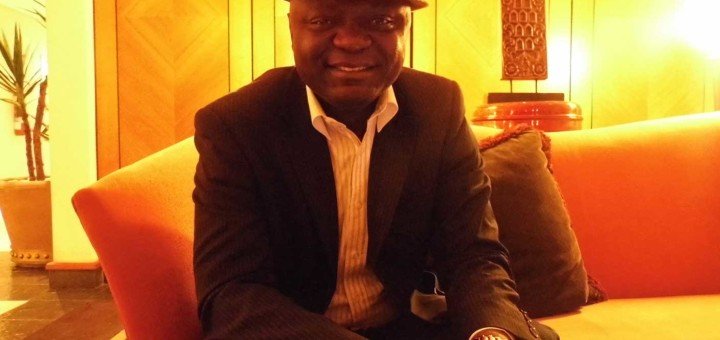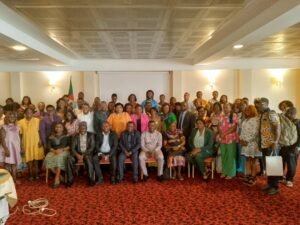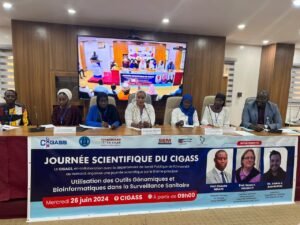 Dr Migombano in an interview granted at the end of the Stakeholders’ dialogue on Sexual Reproductive Health and Rights (SRHR) post 2015 in Lusaka-Zambia.
Dr Migombano in an interview granted at the end of the Stakeholders’ dialogue on Sexual Reproductive Health and Rights (SRHR) post 2015 in Lusaka-Zambia.
In the first place make an assessment in Africa of SRHR in emergency situations?
In Africa there are a lot of things happening currently in terms of emergency situations and you have a quiet number of people who have been displaced over for these reasons and especially from conflicts perspectives and according to the UNHCR there are even more than 40 Million people displaced. And if you observe, the big contributors, let me call them like that, are countries such as South Sudan, Central African Republic etc hosting a lot of refugees. Apart from just having these big numbers of refugees as you know, almost 50% are women and usually we expect 40% of this population to be pregnant during these periods.
What is the project put in place by IPPFAR on emergencies all about?
Our project actually is all about supporting SRHR in emergency situations in Africa. As earlier said; in conflicts most of the reproductive ill related issues increase. We have gender based violence, HIV/AIDS spreading match quickly due to promiscuity, high density of the population and maternal death is occurring and we know that 60% of maternal death occur during fragile state and most of these fragile states are in Africa, where we find most of those refugees. Before moving forward, let me explain the fact when mapping out that unmet needs in terms of family planning and reproductive health are mostly in these countries where these humanitarian projects are occurring. IPPFAR is therefore trying to see how to address all these issues; it does not mean that we will be doing everything but we have a project, it is also a model of responding to emergencies. It is known as SPRINT; sexual and reproductive health programme in crisis and post crisis situations. It is an Australian Aid founded programme and what actually we are doing with this programme is really working around all emergencies’ cycles and this is called systemic change. This is from let’s say Development to emergency response passing through recovering and mitigations. So we try in all these phases to provide any support when a country actually has been hit by a crisis, we try to mobilize some partners including our Member Associations or NGOs available to provide any support. In the cases of Central African Republic (CA R) and Cameroon, we were providing SRHR responses in CAR using our Member association ACABEF, we fund from SPRINT and together with UNFPA country’s office. But in case there is no crisis or when people are still let’s say trying to mitigate or be prepared, we also provide a capacity building in terms of trainings. That is something for instance that we did in Cameroon, just provide the same support in collaboration with CAMNAFAW and UNFPA, supporting governments and partners from NGOs to build their knowledge in responding in SRH when on the field and be equipped to receive refugees like those from CAR.
In terms of policies, we work with all policy makers at all the levels from global, regional and national to ensure that while people are preparing for any response, SRH is actually integrated in that response. In Cameroon for example, our job is to ensure that the country’s reproductive health policy should be a portion in terms of what to do in any emergency situation. We are working with governments in order to improve these policies. The same job is done in collaboration with regional blocs as in the stakeholders’ dialogue on SRHR in Lusaka-Zambia. This is to ensure that in their own policies whatever policies they are working around, they include SRHR issues so that we do not neglect as we have seen from many evaluations that usually this aspect is neglected since it is a saving life intervention.
As outcome and challenges of this stakeholders’ dialogue, what can we retain?
First of all as a challenge, the most important issue that we need from the various stakeholders is really for them to play their role of guiding countries in terms of policies and guidelines. It is something quite important as you have seen most of them, they have already worked around disasters’ risk reduction but what is not mentioned is the place for SRHR, we are working around the issue, trying to ensure that they take this into account but also since we are talking of the International Conference on population and Development (ICPD), the Maputo Action Plan (MAP) post 2015. We want to ensure that there will be something around SRHR for displaced refugees and internal displaced because this is an aspect that is not clearly mentioned in all those documents and I think as an outcome, we have been able to share this information with them and I hope they now recognize how important it is since we are still at the level of negotiations and people are still negotiating. Even at the global level, we have teams with our partners called inter agencies working group in reproductive global movements and we are working around those ICPD’s post 2015 so that we ensure that any reproductive health especially in emergencies is part of the activities that will been integrated in a bid to help us in the future to actually mobilize more resources around SRHR as I said. Since it is neglected, we really need additional resources to build capacity. These additional resources actually are to respond and if we do not, this reproductive health issue embedded in these documents and statements will be very difficult for us to mobilize such resources. And from the feedback gotten from some peers of the regional blocs, there are some activities that will be undertaken in terms of review of policies and guidelines and see how they can incorporate reproductive health.
By Elise Kenimbeni





